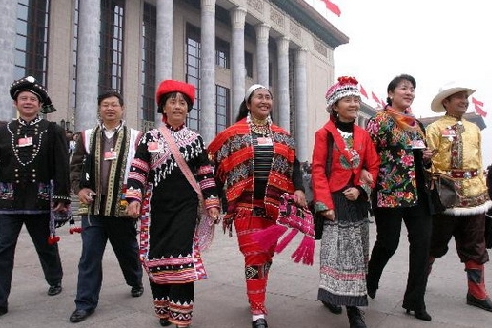Wear national costumes should respect individuals
Long Cargo Pants,Men's Pants,Men's Trousers,Men's Long Casual Pants zhejiang tianjin import and export co.,ltd. , https://www.tianjintextile.com Representatives and members from ethnic minorities in our country wear colorful national costumes to become a scenic spot for various venues during the period.
Representatives and members from ethnic minorities in our country wear colorful national costumes to become a scenic spot for various venues during the period.
Some of these ethnic minority costumes are clothing in everyday life, but some ethnic minority costumes are only worn in history. They are usually kept only in museums or used in stage performances. The representatives and members of these ethnic minorities wore national costumes, and more importantly, they used this to demonstrate to the outside world the exercise of the rights of the minority nationalities participating in politics in our ethnic policy.
In the mid-1980s, during my time studying at the Central University for Nationalities, many classmates were asked to wear national costumes to the Great Hall of the People to participate in some large-scale political activities. Our role is to display as a national minority representative to the outside world. It proves that all ethnic groups are equally involved in various political activities. My later younger brothers and sisters also repeatedly experienced the same scene.
Domestic news is also often seen today. Some leaders inspect ethnic regions and local ethnic minorities wear national costumes and leaders together in the labs, production lines, offices, etc., on television screens or photos. Whenever I see this, I will laugh. I know that the ethnic clothes are worn. Because in reality, no matter what the nationalities are sure to wear in these places are professional work clothes, it may not be national dress.
Clothing, like other ethnic features of a nation, also has historical changes. Who can now tell what is the national costume of the Han? Hanfu? robe Machang? The tunic of Chinese tunic is the national costume of the Manchu, and it has now become one of the symbols of Chinese traditional culture. The majority of people who like to wear cheongsam are not Manchu. Suits are also exotic, but now they have become formal suits. We don't wear suits to recognize and accept everything in the West. Why, then, why ethnic minorities' costumes have been given political meaning and become a kind of political symbol in a tagged manner, so that they are cured and misunderstood?
In our country, there was a time when personal dress was used to determine its political position. There were also cases in which the western media used Chinese dress to determine the direction of Chinese politics. It turns out that these are all wrong.
In fact, what kind of dress is entirely a matter of personal self-selection, there is no need to raise it to the point of political symbols. The achievements of China’s national policies do not need to use the props of national costumes to show them to the public. Otherwise, it will only lead to more pan-politicized imaginations of national costumes, which will have an adverse effect on the actual work. National costumes are the product of the practical and aesthetic use of garments by all ethnic groups and are also the personal choices of members of various ethnic groups. The best practice is to respect individual choice. Wearing this national costume does not mean that we are self-contained and unwilling to accept the outstanding ingredients of other peoples. Eliminating the political colors of national costumes and returning national costumes to the original intentions of their personal products can eliminate the tendency of national costumes to be politically instrumental.
In short, whether or not ethnic minorities wear ethnic costumes in various places should completely become their personal choice. Ethnic costumes should be a multicultural expression rather than a declaration of political color.